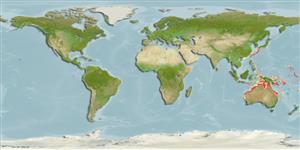Environment: milieu / climate zone / depth range / distribution range
Ecologia
marinhas demersal. Tropical
Western Pacific: northwestern Australia (Ref. 5978) and Papua New Guinea.
Tamanho / Peso / Idade
Maturity: Lm ? range ? - ? cm
Ventral surface of lower jaw smooth, no prickles or papillose villi. Mandibular cirri almost confined to outer margin. Snout with large, fleshy, and extensively branched cirri; those in larger patches on tip of snout and across lachrymal bone large while those in smaller patches on nasal bone are smaller. Fleshy pad on isthmus with its width about 0.5 to 0.75 of its length (Ref. 39602).
Found inshore, in soft bottom (Ref. 75154).
Ciclo de vida ou comportamento de acasalamento
Maturidade | Reprodução | Desova | Ovos | Fecundidade | Larvas
Kailola, P.J., 1987. The fishes of Papua New Guinea: a revised and annotated checklist. Vol. II Scorpaenidae to Callionymidae. Research Bulletin No. 41, Research Section, Dept. of Fisheries and Marine Resources, Papua New Guinea. (Ref. 6192)
Status na Lista Vermelha da UICN (Ref. 130435: Version 2024-2)
Ameaça para os humanos
Harmless
Uso pelos humanos
Ferramentas
Relatórios especiais
Baixar XML
Fontes da internet
Estimates based on models
Preferred temperature (Ref.
123201): 24.3 - 28.6, mean 27.2 °C (based on 302 cells).
Índice de diversidade filogenética (Ref.
82804): PD
50 = 0.5078 [Uniqueness, from 0.5 = low to 2.0 = high].
Bayesian length-weight: a=0.00537 (0.00215 - 0.01342), b=3.14 (2.92 - 3.36), in cm total length, based on LWR estimates for this (Sub)family-body shape (Ref.
93245).
Nível Trófico (Ref.
69278): 3.4 ±0.3 se; based on size and trophs of closest relatives
Fishing Vulnerability (Ref.
59153): Low vulnerability (10 of 100).
